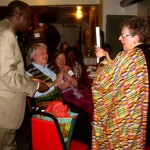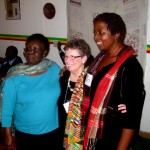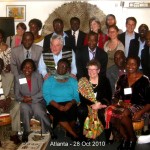2014
RC22-ISA Newsletter 9/10 (2013)
The electronic 2013 RC22-ISA Newsletter – of the Research Committee 22 on Sociology of Religion of the International Sociological Association (ISA), edited bty Afe Adogame – has appreared. It contains items and announcements that are of interest to AASR Members also.
2014
SSSR Student Travel Awards
This year The Society for the Scientific Study of Religion (http://www.sssrweb.org/) is encouraging international students to participate and to consider submitting applications for travel funding to its annual conference, to be held in Indianapolis, Indiana on October 31 – November 2, 2014.
Travel assistance to help defray the costs of attending the annual meetings is available for graduate students. Formal application using the form supplied is required for consideration (Application). Applicants are asked include an abstract of their paper and to provide their contact information, name of their academic advisor, academic program status (MA, ABD, on the job market, etc.), if they have attended the SSSR meetings before, their SSSR program status (presenting, co-author but not presenting, etc.), and any additional sources of funding such as departmental travel assistance or some similar funding.
Application Form: www.sssrweb.org/pdf/Student_Travel_Award_Application_2012.doc
Applicants should download the form, fill out all the required information and submit electronically by March 31, 2014. This is the same as the deadline for submitting a paper abstract or session proposal. SSSR has instituted a policy of mandatory preregistration and prepayment for 2014 with a deadline of May 31. Therefore, award winners will be notified by April 30 (same day as notification of paper or session acceptance) so they can plan accordingly.
Please send applications to:
Gabriel Acevedo, Chair, Student Travel Awards Committee, Gabriel.Acevedo@usta.edu
Applications received after the deadline will not necessarily receive consideration. Awardees will be notified by email by April 30, and the award checks will be distributed IN PERSON at the SSSR meeting.
2014
BASR annual conference, 3-5 September 2014
The 2014 conference of the British Association for the Study of Religions (BASR, http://www.basr.ac.uk/index.htm) will be hosted at The Open University, Walton Hall, Milton Keynes, MK7 6AA, UK, Tel: +44 (0) 1908 274066, website: www.open.ac.uk
The BASR 2014 annual conference has two themes: “religion, art and performance” and “the cutting edge”. Both can be interpreted broadly. Panels and papers are invited.
Religion, art and performance
Religion is at least represented in artistic and dramatic ways. It has been argued that theatre began in religious rituals, that visual arts began as demonstrations of religious knowledges, and that literature arose from religious myth-telling. Perhaps pre-modern arts of all kinds were fundamentally religious. Contemporary religion has interesting relationships with art and performance: from the use of ritual-like acts on stage to the staging of religious rites to impact a wide public; from the portrayal of religious themes in art to the emerging emphasis on “religion as act” or “religioning” in recent scholarly theorising. Perhaps religion is a performative art. Is it still valid to distinguish ritual from drama on the grounds that the former involves only participants while the latter invites audiences? What difference does the display of religious acts or things in museums, galleries, theatres, heritage and tourist venues make? Ideas and questions like these (and there are many more) seem likely to enhance the value of the study of religions to interdisciplinary scholarship. Perhaps the study of religion could be improved by dialogue with scholars of art or performance, and/or vice versa. The BASR 2014 conference provides an opportunity to explore these and other questions and debates. Therefore, we invite panels and papers about religion, art and performance (all defined broadly).
The cutting edge
Many BASR members also belong to scholarly associations for the study of specific religions or for the advancement of specific approaches to religion(s) (e.g. anthropology, philosophy, sociology and more). We invite panels on the cutting edge of debates that focus on specific religions or apply specific approaches. In doing so we hope various forms of cross-fertilisation will enrich the field of studies of religion.
All correspondence about the conference (other than the bursaries) should be directed to arts-basr@open.ac.uk
2014
A new book by Jim Cox
James L. Cox, 31.01.2014, The Invention of God in Indigenous Societies. Edinburgh: Acumen Publishers, 192 pp., ISBN-13: 978-1844657551 (pbk), BP17.99, discount price BP14.39
Indigenous societies around the world have been historically disparaged by European explorers, colonial officials and Christian missionaries. Nowhere was this more evident than in early descriptions of indigenous religions as savage, primitive, superstitious and fetishistic. Liberal intellectuals, both indigenous and colonial, reacted to this by claiming that, before indigenous peoples ever encountered Europeans, they all believed in a Supreme Being. ‘The Invention of God in Indigenous Societies’ argues that, by alleging that God can be located at the core of pre-Christian cultures, this claim effectively invents a tradition which only makes sense theologically if God has never left himself without a witness. Examining a range of indigenous religions from North America, Africa and Australasia – the Shona of Zimbabwe, the ‘Rainbow Spirit Theology’ in Australia, the Yupiit of Alaska, and the Maori of New Zealand – the book argues that the interests of indigenous societies are best served by carefully describing their religious beliefs and practices using historical and phenomenological methods – just as would be done in the study of any world religion.
CONTENTS:
Preface
1. The ‘God’ Controversy in Pre-Christian Indigenous Religions
2. Making Mwari Christian: The Shona of Zimbabwe
3. How God Became Australian: Transforming the Rainbow Serpent into the Rainbow Spirit
4. The Alaskan Exception: The ‘Person of the Universe’ and Christian Neglect
5. The Debate over Io as the Pre-Christian Māori Supreme Being
6. Indigenising God: The Conflict between Fact and Value
Bibliography
Index
Reviews
Cox’s insightful study of the concept of the ‘high god’ in four indigenous cultures, and its complex relationship with Christian missionary preaching of the Biblical God, is a major scholarly achievement.” – Carole M. Cusack, University of Sydney
“This book is an excellent argument for the need to study indigenous religions as the beliefs and practices of indigenous peoples, as traditions in their own rights.” – Bettina E. Schmidt, University of Wales Trinity Saint David
James L. Cox is Emeritus Professor of Religious Studies in the University of Edinburgh. His most recent books include ‘An Introduction to the Phenomenology of Religion; From Primitive to Indigenous: The Academic Study of Indigenous Religions‘ and ‘A Guide to the Phenomenology of Religion‘.
2014




